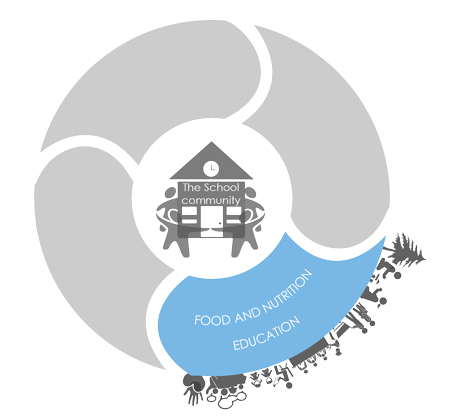School-based food and nutrition education
School-based food and nutrition education (SFNE) consists of educational strategies and learning activities, which supported by a healthy food environment, help schoolchildren, adolescents and their communities to improve their diets and food choices. It further helps to build their capacity to act as agents of change.
FAO promotes a “whole school” approach to SFNE, actively involving all people that interact in the school setting, including children, their families, teachers, school staff, local farmers, foodservice staff, food vendors, and government staff.

Schools are a unique opportunity to support good nutrition and the development of children and adolescents. The school setting is one of structured learning, a place where those who influence children’s food perceptions, practices and habits interact. It is a venue for making choices and decisions about food. SFNE capitalizes on this and creates learning opportunities and experiences that can shape healthier food patterns, especially when supported by a healthy food environment.
Countries are increasingly integrating food and nutrition education as a core element of their national curricula and of their school food and health policies. However, more still needs to be done to reach the full potential of food and nutrition education in schools. FAO is currently working to understand how SFNE is integrated into national education systems around the world and to examine what are the capacities and resources needed across the system.
As food is at the center of many modern sustainable development challenges, a new vision and approach to traditional SFNE is needed, one where children and their communities develop capacities that support their health and wellbeing, and are empowered to become active agents of change in their local food systems.
To achieve this vision, new paradigms are needed that go beyond classroom-based transmission of basic and generic nutrition information, to ones that promote hands-on learning and skill development, the use of different media and technologies, opportunities to deal with food, and practice in real life settings (in canteens, markets, playgrounds, homes, communities).
FAO is working with various partners to advance this new vision and to provide governments with technical support, guidance and capacity development strategies to integrate effective SFNE in their school systems.

